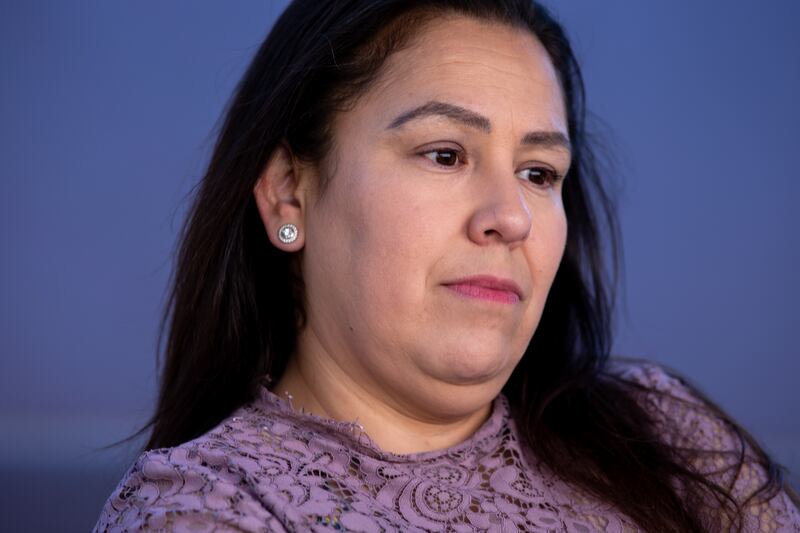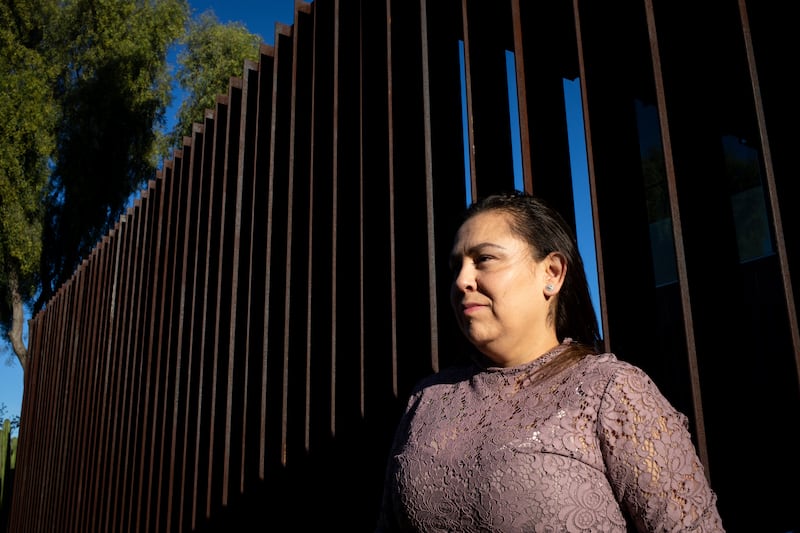SALT LAKE CITY — When Ruby Torres was diagnosed with cancer in 2014, at age 33, she was told her treatment could cause infertility. Torres knew she wanted to be a mother, so to increase her chances of having a biological child later on, she and her then-boyfriend John Terrell, then 37, agreed to create embryos — using her eggs and his sperm — and have them frozen for later implantation through in vitro fertilization, according to court documents.
At the fertility clinic, the couple signed a contract: if they were to split up, the embryos could either be donated to another couple, or one partner would be allowed to use them — as long as the other partner granted permission, court documents state. Four days later, they married.
In 2017, they divorced after three years of marriage, and a court battle over the embryos began. Torres wanted to keep the embryos, but Terrell didn’t want to father children with his ex-wife. A family court initially ruled in favor of Terrell, and then an appeals court overturned the decision and ruled in Torres’ favor. But on Jan. 23, the Arizona Supreme Court overturned the decision yet again, ruling in Terrell’s favor and requiring the couple to donate the embryos.
“It’s been an emotional roller coaster, but I’ve had hope from the beginning that one day I would be able to carry one of my own embryos,” Torres told the Deseret News. “Getting to this point, knowing that I’m going to be 40 and I have to have a hysterectomy to ensure that I don’t have cancer again, it’s very hard. I spent most of the weekend crying.”
Terrell did not respond to multiple interview requests from the Deseret News. The court said it was “cognizant of the unavoidable emotional fallout” that could come from the decision, but because the couple couldn’t come to an agreement, the court said, under the contract, “the court could only direct donation of the embryos.” Torres’ lawyer, Stanley Murray, said he takes issue with the court’s ruling, arguing that the contract’s language gave the court the authority to intervene and award the embryos to one of the parties in the event that the couple couldn’t agree.
The decision comes at a time when advances in reproductive technology have made it possible for many people — such as single parents, LGBTQ couples, cancer survivors, people with fertility challenges — to have biological children who may not have been able to do so in the past. But with these new advances come a new set of moral, ethical and legal questions: should embryos be considered marital property? Are embryos life?

‘No one should be forced to become a parent’
The Torres case is not the first to take on a dispute over embryos. In a case that made headlines in 2014, actress Sofia Vergara’s ex-husband attempted to sue Vergara for the right to use the frozen embryos they had created when they were together (Vergara, who has since remarried, didn’t want the embryos to become children).
Court disputes over embryos date back as early as the 1990s, but because family law varies from state to state, courts across the country have ruled differently in different cases, so there isn’t a legal consensus about how these cases should be decided, said Naomi Cahn, a professor at George Washington University School of Law who specializes in reproductive technology.
But what underlies many of the cases is a fundamental question: which is more important — the right of a person to become a parent, or the right of a person not to become a parent?
“I think the core principle is no one should be forced to become a parent against their will,” said Dr. Arthur Caplan, founding director of the Division of Medical Ethics at New York University Langone Medical Center. “Both parents have to consent to the use of the embryo.”
Caplan says that principle should be true even if the partner who is using the embryo is not asking for child support or parental involvement from the other party (Torres was not asking either of Terrell). The issue isn’t money, it’s the ability to choose whether or not a person is created and enters the world without your permission but with your genetic material, he said.

A 1992 case in Tennessee, Davis v. Davis, backed up Caplan’s view, allowing embryos to be destroyed over the objections of the wife who wanted to use them. But other cases have swung the other way: a 2015 case in Illinois, Szafranski v. Dunston, awarded embryos to a woman over the protests of her ex-boyfriend.
Embryos: people or property?
While embryo disputes have shown up in the courts, state legislatures have largely been hesitant to take on this complex and thorny matter, said Caplan.
But an exception to that trend came about as a result of the Torres case. In 2018, Arizona became the first state in the country to pass a law that would allow frozen embryos to be given to the person who wants them to develop “to birth” after the couple divorces.
Cultural attitudes play an important role in how people think about embryo disputes, said Cahn.
“There are a lot of cultural anxieties over reproduction and preserving fertility, in the context of both cancer as well as the context of women aging and fertility decreasing,” said Cahn.
Though embryos are not fetuses, disputes over frozen embryos are an interesting twist on the pro-life vs. pro-choice debate, said Cahn, with cultural anxieties on this issue often wrapped up in a larger ideological debate about whether an embryo is life. But this issue is different from the abortion debate, said Cahn, as embryos are jointly shared genetic material that exist outside of the body, whereas a pregnancy takes place inside of a woman’s body, and therefore brings issues surrounding a woman’s own bodily autonomy, privacy and health into play.
“The status of embryos as people or property or potential people remain unsettled,” said Caplan. “It has been for years. There is no consistency and no answer emerging from state courts. Some have said we can’t treat embryos as people, some have said they definitely are people.”
As far as Caplan is concerned, embryos aren’t people. Embryos cannot on their own, without being implanted inside a woman’s uterus, become life.
“Personally, I think embryos are not people,” he said. “While it’s true that every life begins at conception, not every conception can turn into a life. I’m in the camp that says embryos are not people, but we can treat them as human biological material that is deserving of respect.”
‘It’s hard to know that I will never see that child’
With IVF becoming more and more common, the courts are likely to see increasing numbers of embryo disputes, she said.
“This issue is going to keep coming up,” said Cahn. “There are relatively few states that have dealt with it, but there are hundreds of thousands of embryos being stored. So this issue is, as it were, very much alive.”
Moving forward, Cahn says clinics should do a better job of counseling couples before they decide to take this important step. They need to have a thorough understanding of the implications of creating an embryo together, both legally and ethically, if the couple were to separate or one of them were to pass away.
“When you’re considering in vitro fertilization, what you’re really focused on is: will I get pregnant? It’s really really hard to project into the future, and ask tough questions like: will my relationship survive? What will happen to the embryos if we get divorced?” she said.
Caplan says the increasing popularity of IVF has made it into a highly profitable industry, one that lacks requisite regulation or oversight — which would provide stricter guidelines for ensuring patients give informed consent about the ramifications of their decision.
“In vitro fertilization has become such a huge business that they lobby to be able to do what they want,” he said. “And people who use IVF are so desperate to have kids that they don’t want any regulation. They just want to have babies.”
Meanwhile, Torres is considering taking the case to the U.S. Supreme Court, but fears her dream of having biological children will never come true.
“It gives me some hope that my embryos are not completely gone, maybe somebody will adopt them,” she said. “Maybe somebody will be able to have my child with my embryos and bring that child to term and raise them. But it’s hard to know that I will never see that child.”


